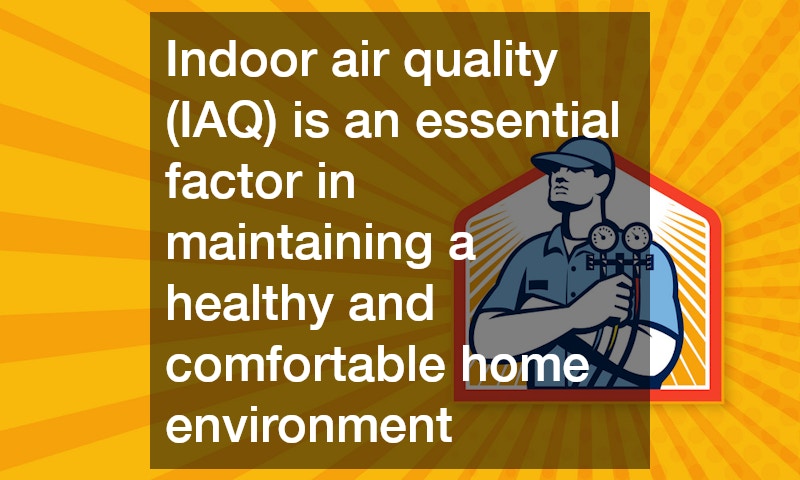Indoor air quality (IAQ) is an essential factor in maintaining a healthy and comfortable home environment. While air conditioning systems are primarily known for regulating temperature, they also play a significant role in filtering and circulating the air inside your home. When your AC system isn’t functioning properly, it can negatively impact IAQ, exposing your household to dust, allergens, and pollutants. Understanding how timely AC repair contributes to improved indoor air quality is vital for both your health and overall comfort.
How AC Systems Affect Indoor Air Quality
Air conditioning systems do more than cool your home—they are integral to air filtration and humidity control. Your AC pulls in warm air, cools it, and circulates it back into your living spaces.
During this process, filters trap airborne particles such as dust, pollen, and pet dander, helping to maintain cleaner air.
However, when your AC system experiences issues, its ability to filter and circulate air diminishes. For example, clogged filters, dirty coils, or malfunctioning components can compromise the system’s efficiency, allowing pollutants to linger in the air. These issues not only affect comfort but can also pose health risks, particularly for individuals with allergies or respiratory conditions.
The Impact of Delayed AC Repairs on IAQ
Delaying repairs can have serious consequences for your indoor air quality. A malfunctioning system may circulate contaminated air, leading to an accumulation of allergens, bacteria, and other pollutants in your home. Over time, this can exacerbate respiratory issues, trigger allergies, and even increase the risk of illness.
For instance, if your AC system has a refrigerant leak or dirty evaporator coils, it may fail to dehumidify your home effectively. Excess humidity creates an ideal environment for mold growth, which can release harmful spores into the air. Addressing these issues promptly through AC repair ensures that your system functions optimally, safeguarding the quality of the air you breathe.
The Role of Filters and Their Maintenance
One of the most critical components of an AC system is its filter. Filters capture airborne particles, preventing them from recirculating in your home. However, when filters become clogged or dirty, they lose their effectiveness, allowing pollutants to bypass the filtration process.
Neglecting to replace or clean filters regularly can strain your system and lead to poor indoor air quality. If your AC isn’t cooling effectively or you notice an increase in dust around your home, it could indicate a problem with the filter. Professional AC repair technicians can inspect and replace filters as part of routine maintenance, ensuring your system operates efficiently and keeps your air clean.
Preventing Mold and Mildew Growth
A poorly functioning AC system can contribute to excess moisture in your home, creating the perfect conditions for mold and mildew growth. Mold not only damages your property but also releases spores that can negatively impact your health. Common symptoms of mold exposure include nasal congestion, coughing, and skin irritation, with more severe reactions in individuals with asthma or compromised immune systems.
Regular AC repairs can help prevent these issues by addressing underlying problems such as refrigerant leaks, drainage blockages, or faulty dehumidification. Ensuring your system removes excess moisture effectively is key to maintaining a healthy indoor environment.
How AC Repairs Improve Ventilation
Proper ventilation is crucial for maintaining fresh and clean indoor air. Your AC system plays a significant role in circulating air and reducing the buildup of stale or polluted air inside your home. When your system isn’t working correctly, ventilation suffers, leading to stuffy or uncomfortable conditions.
Repairs can restore proper airflow by addressing issues like blocked vents, damaged ducts, or failing blower motors. By improving ventilation, your system helps to dilute indoor pollutants, ensuring fresher air throughout your living spaces.
Protecting Your Family’s Health
Indoor air quality has a direct impact on your family’s health and well-being. Poor IAQ can lead to short-term symptoms like headaches, fatigue, and irritation of the eyes, nose, and throat. Prolonged exposure to pollutants, however, can contribute to chronic respiratory issues, cardiovascular problems, and other health concerns.
Your air conditioning system is a cornerstone of indoor comfort and air quality. Neglecting repairs can compromise its ability to filter, dehumidify, and ventilate effectively, leading to poor IAQ and potential health risks. By prioritizing timely AC repair, you can protect your family’s health, maintain a clean and comfortable home, and ensure your system operates at peak performance.
.
